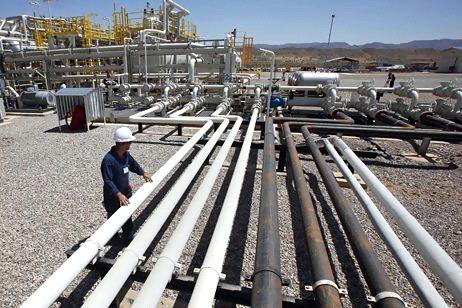Ammon News - DUBAI (The National) - Oil has always been closely intertwined with politics, and nowhere is this more evident than in Iraq.
At a time when the country's oil sector is beginning to shrug off the effects of years of war and sanctions, a bitter dispute between the central government in Baghdad and the Kurdish Regional Government in Erbil still represents a conundrum for the international oil companies hoping to exploit the country's vast resources.
The oil industry has begun to hit its stride, and output at the supergiant fields is starting to do justice to the massive reservoirs in the south.
Last year, Iraqi oil production surpassed the 3 million barrels per day (bpd) mark for the first time in the post-Saddam era.
The dispute between the central government and Erbil over production and revenue-sharing is showing no signs of resolution, however.
Because Baghdad denies the KRG the right to independently strike oil contracts, it has withheld most of the payments oil companies have been promised by the regional government. This has put international oil companies (IOCs) in Iraq's Kurdish region in a difficult situation, and has stymied the development of the region's abundant reserves.
But the Kurds have not remained idle as Baghdad withheld most of the oil money they thought they were owed in return for channelling their output through the main Iraqi export infrastructure. As they have once again halted exports in protest over payments, the Kurds are putting the finishing touches to a pipeline that will be able to carry all Kurdish oil exports directly to Turkey.
The pipeline will have an initial capacity of 300,000 bpd, Ashti Hawrami, the KRG's energy minister, said in London this month. Upgrades will enable it to carry 1 million bpd by 2015, and twice that by 2019, mirroring Kurdish production targets, which could allow for exports of 2 million bpd by the end of the decade.
The project is nothing short of a game-changer, and a vindication for the oil and gas companies that have flocked to the autonomous region in increasing numbers in defiance of Baghdad wishes.
"This pipeline will help recover costs and make investments in the north worthwhile," said Luay Al Khatteeb,the executive director of the Iraq Energy Institute.
This will bring relief to the IOCs active in the Kurdish region. Apart from withholding the bulk of payments to oil and gas companies producing in Kurdish Iraq, the central government has also resorted to more targeted measures.
Companies that signed oil deals with the KRG were blacklisted from bid rounds for blocks in the south. When ExxonMobil became the first oil major to move into Kurdish Iraq, Baghdad's angry reaction forced it to put up for sale its stake in the massive West Qurna-1 field. These measures have proved futile, and two more majors - Chevron and Total - have followed Exxon into the region.
Once the new pipeline is able to deliver oil to the terminal at Fishkabur on the Turkish border, export revenues will go straight to the KRG, which has already pledged to remunerate the oil and gas companies.
A recent law passed by the regional government stipulates that US$4 billion of outstanding payments will be handed out. After the cost of the pipeline has been covered, the Kurds have pledged to hand oil revenues over to the central government, in return for the 17 per cent of the federal budget they are entitled to under the constitution.
With direct oil exports guaranteed, future attempts by Baghdad to choke off the development of the Kurdish energy sector by withholding payments are likely to come to naught.
"If Baghdad still doesn't pay, I'm sure there will be a new law to pay the companies in future," said Shwan Zulal, who works at the Kurdistan Connect consultancy.
The pipeline will also raise the value of acreage in Kurdish Iraq, and transform the fortunes of the smaller players that were the first to come to the region.
"The value of the blocks will rise, and small oil companies will see their valuations quadruple," said Mr Zulal.
"The majority of small players are in the KRG to find some oil and be bought out by a major."
A circle of payment and further investment beckons, which make the ambitious Kurdish oil production targets seem possible, and promises a windfall for IOCs.
With the contracts signed by the KRG far more lucrative than those handed out by the central government, the early movers into the region stand to be rewarded for their appetite for risk.
